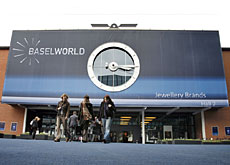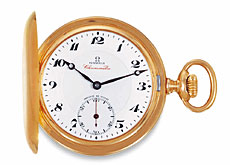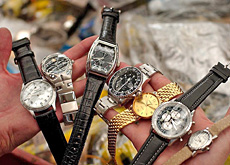World of luxury descends on Basel

Luxury from around the globe will be sparkling and glittering in Basel over the next week as the city hosts the annual Baselworld watch and jewellery show.
With the luxury sector enjoying unprecedented success – increasingly in emerging markets – hopes are high that the trade fair will boost sales to new records.
Finance Minister Hans-Rudolf Merz opened this year’s event on Thursday, describing the Swiss watch industry as the backbone of the economy.
The show is known mainly for the glamour of luxury watch brands.
It’s the occasion for exhibitors to present their new collections which they hope will catch the eye.
Jean-Daniel Pasche, president of the Federation of the Swiss Watch Industry, told swissinfo he was confident for the future because Switzerland had the ability to innovate.
“We can see dynamism in the Swiss watch industry today. As proof, I would mention the many patents that we have registered over the past year. It’s a sign of innovation, of creativity,” he said.
The president of the exhibitors’ committee, Jacques Duchêne, admits that Swiss watch manufacturers “have never had it so good”, particularly the major prestigious brands.
Exclusive products
One of the key factors, he told a news conference in Basel on Wednesday, was the continuing fascination with exclusive products.
“Luxury brands are yet again responsible for boosting the figures. We estimate that they contribute about 80 per cent to exports, which is a remarkable feat.”
While some are rubbing their hands at the increasing number of potential buyers in countries such as China, India and Russia, Duchêne offers a word of caution.
“Our industry can become vulnerable at any time. After all, we export 95 per cent of our production, so we are therefore totally dependent on the international environment.”
Duchêne said no one was immune to natural disasters or crises, a reason why the industry had to remain “vigilant” and be prepared to deal with any eventualities.
Fakes
One reality of international business, he noted, was the growing problem of counterfeit products, with record numbers now being made.
The problem is nothing new to the industry federation in Biel, which has a permanent programme aimed at stemming the tide.
Pasche told swissinfo counterfeiting represented a “big danger”.
“I would say that the internet has increased this problem because it’s easier today to buy a fake watch than in the past.”
Duchêne estimates that the damage caused to the Swiss watch industry by fakes is SFr800 million ($656.25 million), commenting that the days of cheap imitations are over.
“The technical skill of the counterfeiters has considerably increased. We are faced with products that are becoming more and more difficult to detect. Only the experts are in a position to tell the difference.”
Pasche does not mince his words about people who buy fake watches, most of these timepieces having their origins in the Far East.
“They are damaging the Swiss industry, employment in Switzerland and supporting criminal organisations abroad that exploit children and women who have to manufacture them.
“You have to know that these organisations do not pay social security and taxes, and they do not contribute to the development of their countries,” Pasche emphasized.
swissinfo, Robert Brookes
Baselworld (April 12-19) is Switzerland’s largest trade exhibition. Number of exhibitors: 2,109. Visitors expected: more than 90,000. Countries represented: 45.
Switzerland occupies 45.9% of the Baselworld exhibition surface and represents 20% of exhibitors (422).
Italy, Germany and France follow Switzerland.
Hong Kong accounts for 17.2% of exhibitors.
2,529 journalists from 70 countries were accredited last year (+7% over 2005).
A complementary show (Salon International de la Haute Horlogerie) runs in Geneva (April 16-21).
Switzerland’s watch exports have been going from strength to strength. In 2006, they totalled a record SFr13.7 billion. This was an increase of 10.9% over 2005, which was also a record year.
Swiss exports in February at SFr1.127 billion had never been so high at such an early stage of the year.
The main exporting countries in 2005 were Switzerland, followed by Hong Kong, China, Germany and Japan.
Non-governmental organisations, including the Solidarity Fund for the Social Struggles for Liberation in the Third World (Solifonds), complain that some of the sparkling gemstones on show at Baselworld are killing Chinese workers.
They say they are dying of silicosis, a deadly occupational disease caused by inhalation of silica particles in the workplace of the gemstone processing industry.
The NGOs want Baselworld to outlaw sweatshop companies attending the exhibition and enforce international labour rights standards.
The home of Baselworld is to get a facelift over the next few years with a new three-storey complex costing SFr350 million.
Renowned Basel star architects Herzog & de Meuron are the designers.
Swiss Exhibition says when the complex opens in 2012 Basel will benefit from a “new architectural landmark”.

In compliance with the JTI standards
More: SWI swissinfo.ch certified by the Journalism Trust Initiative











You can find an overview of ongoing debates with our journalists here . Please join us!
If you want to start a conversation about a topic raised in this article or want to report factual errors, email us at english@swissinfo.ch.